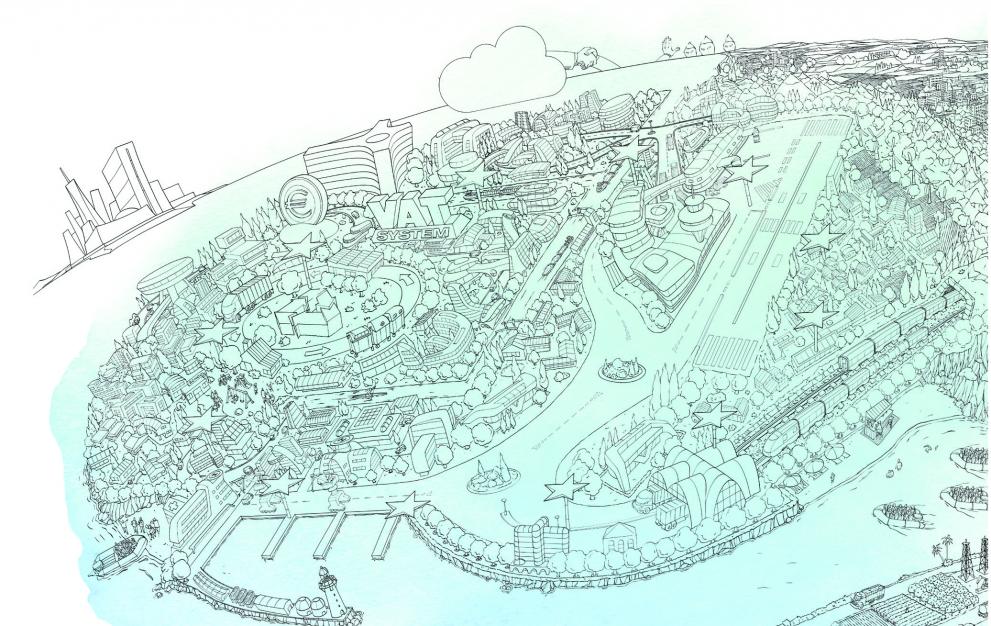
Today, the JRC publishes a report on the Future of Customs, the results of a foresight project exploring how the world might look by 2040, and how policymakers can take actions now to ensure the EU Customs Union continues to benefit citizens, the environment and the economy.
The project finds that having a joint governing structure to manage the EU Customs Union would be beneficial in all future scenarios for 2040. It also finds that digital skills and harmonised IT systems will be key to the success of customs in the coming years.
To explore how best to build a positive future for customs, the JRC assembled key experts and stakeholders from across academia, business, customs authorities, European Commission services, international organisations, civil society, and non-EU countries.
Together they developed a vision for EU Customs in 2040. The vision will help those leading the EU Customs Union to steer their policies and operations in a clear and desired direction.
The Customs Union is a foundation of the EU and an essential element of the single market. Customs has a major role in protecting EU revenues and the security, health and prosperity of EU citizens and businesses.
In today’s fast-changing world, customs authorities face several challenges like the coronavirus pandemic and the UK’s imminent exit from the EU. Customs authorities must also adapt to long-term trends like the rise in digitalisation and e-commerce.
The stakeholders involved in the foresight process identified the connection with other policies, such as environment, social, trade, consumer protection, justice and home affairs, as one of the most important drivers of change.
The vision they created was preceded by the development of future scenarios on how EU Customs could be like in a dynamic or stalling European economy; and in a peaceful or conflict-ridden world. The scenarios provided useful narratives that inspired the common vision.
Recommended actions for the future of the EU Customs Union
Through the foresight process, the stakeholders came up with several recommendations on how to achieve the vision of an EU Customs Union that, by 2040, acts as one and fully protects society, the environment and the EU economy. These include:
- Harmonising national IT systems, or moving to one EU IT system in the mid to long-term , in order to enable customs operations to function efficiently;
- Making the most effective use of customs data and leveraging technological advancements;
- Ensuring the right digital skills for the future of customs across all EU Member States ;
- Driving reforms at the international level through a strong, united European position.
- Creating a joint governance structure to manage the Customs Union.
The findings of the foresight process fed into the Commission’s Customs Action Plan, which puts forward a vision and a plan of ambitious actions to take the Customs Union to the next level. These actions, to be achieved in the period up to 2025, are intended as a first step towards the 2040 vision.
By identifying common challenges and opportunities across potential future scenarios, the group working on the customs foresight project were able to identify common actions that can be taken today to safeguard an EU Customs Union that will be resilient and effective in the future.
This fed into the report’s wider foresight analysis, which included, among several other activities, analysing key trends, possible future challenges, roadmaps and how different actors might interact to achieve the common vision.
Strategic foresight to explore potential futures
One of the outputs of the foresight process is the development of an edition of the Scenario Exploration System on the future of customs.
The Scenario Exploration System is a foresight tool designed by the JRC that immerses participants in collective reflection on potential future scenarios. The EU Customs edition of the Scenario Exploration System was developed to engage with Customs Union stakeholders: all instructions and materials are available for free download.
It is used to explore four possible futures before engaging in a strategic reflection on the preferred future of customs in the EU. These scenarios are:
- ‘Customs for society’: a relatively peaceful world with dynamic EU economic development;
- ‘Protected Union’: a conflictual world with dynamic economic development;
- ‘Customs under strain’: a conflictual world with slow EU economic development;
- ‘No-stop-shop’: a relatively peaceful world with slow EU economic development.
For each of the scenarios, participants consider what these possible futures could mean for customs policy and governance, for data management and IT, for international exchanges, for customs capacity, and for business and operational support.
This tool can be used by Member States and stakeholders to experience possible futures before engaging in a strategic reflection on the future of customs.
The Commission’s 2020 Strategic Foresight Report shows that action-driven strategic foresight is uniquely suited to inform decision-makers to drive the digital and green transitions and strengthen the EU’s resilience.
The JRC foresight team at the EU policy lab employs strategic foresight to explore long-term futures and create shared visions for policymaking. The team work across several policy areas, including agriculture, customs and energy.
Related Content
The Future of Customs in the EU 2040 Foresight and Horizon scanningDetails
- Publication date
- 10 December 2020
